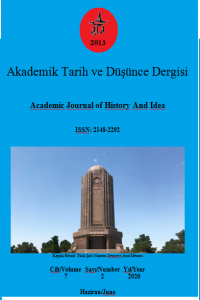The Problem of Pr and Image Competence in the Training of Specialists in Information and Document Management (new challenges to the training of industry specialists)
PR-marketing, PR in libraries, branding in the information space, library education, training of specialists.
___
- Aghamirzayev, A. C. (2021). Historical and cultural formation, evolution and ideological direction of Russian emigration literature, Technium Soc. Sci. J., 23, 755.
- Agamırzayev, A. (2022). The Place of Russian Migration Literature in the Teaching of" World Literature" (Ideological and Political Directions of Migration Literature and" World Literature"), Norwegian Journal of Development of the International Science, (82), 47-51.
- Aghamirzayev, A. C. (2021). " Bright Image" of the first wave Russian emigration literature-Ivan Bunin, Technium Soc. Sci. J., 26, 829.
- Kazimi, P. F. O. (2021). Democratic countries and ways of influencing the nature of information, Technium Soc. Sci. J., 22, 847.
- Kunanets, N., Dobrovolska, V., Filippova, N., Parviz, K., Lypak, H., Duda, O., & Dubrovina, L. (2020, September). Designing the Repository of Documentary Cultural Heritage. In Conference on Computer Science and Information Technologies (1034-1044). Cham: Springer International Publishing.
- Kazimi, P. F. (2021). Conflict of Relevance and Reliability of İnformation and the Global Network, Trends in Humanities and Social Sciences, 1(1), 1-2.
- Kazimi, P. F. & Guliyeva, N. A. G. (2023). " Time" Spent in Youth's “Global Information Space”(Problems of Satisfaction of Reading or Information Need), Procedia Computer Science, 219, 720-723. Kazimi, P. F. (2011). Information engineering in library activity. B. BSU.
- Kazimi, P., & Aliyeva, A. (2019). Evaluation criteria of censorship and limitation in library and information activity, Historical sciences, 17.
- Kazimi, P. (2014). Information Engineering: What's This?. International Journal of Academic Research, 6 (3).
- https://ieeexplore. ieee. org/abstract/document/9648733.
- Yayın Aralığı: Yılda 6 Sayı
- Başlangıç: 2013
- Yayıncı: Hakan YILMAZ
Hatice YILMAZ, İlhami OĞURTAN, İhsan YÜZAK, İlyas CAN, Jiyan DEMİR OĞURTAN, Osman PİLATİN
Bir Dilbilimci Olarak Temmâm Hassân: Hayatı, Fikirleri ve Eserleri
Ermenilerin Kafkasya'daki İddiaları, Büyük Güçlerin Ermeni Sorununu Savunma Sebepleri
Klaudio Maqrisin İtaliya Postmodernizminin İnkişafında Rolu
Okul Yöneticilerin Seçme ve Yerleştirme Süreci İle İlgili Öğretmen Görüşleri
Rıdvan CAN, Hasan YARDIMCI, Deniz BAYAZIT, Songül ŞAHİN, Ramazan ŞAHİN, Servet KAYA
Some Questions of Modern Library and Information Marketing
Elchin AHMADOV, Nigar SEYİDLİ (GULİYEVA)
Azərbaycan Legionları: Saxtalaşdırılan Tarix və Reallıqlar
Fəxrəddin EYLAZOV, Ceyhun ƏLİYEV
Telfik’in İcma ile İlişkisi, Onun Gerçekleşme şekli ve Mezheblerin Buna Yaklaşımı
